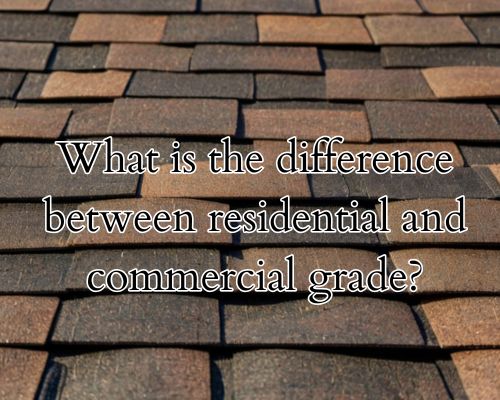When it comes to choosing materials, appliances, or building solutions in New Jersey, understanding the difference between residential and commercial grade is crucial. Whether you’re a homeowner in Montclair or a business owner in Newark, knowing this distinction ensures you invest wisely and get the durability and performance you need.

Understanding the Basics: Residential vs. Commercial Grade
“The terms residential grade and commercial grade describe the quality, durability, and intended use of products or materials. Residential-grade items are designed for everyday home use, catering to the needs of families in suburban towns like Cherry Hill or Princeton. Commercial-grade products, on the other hand, are built to withstand heavy, continuous use in businesses or public spaces like Hoboken’s bustling restaurants or Jersey City offices.” said Charles Jimerson of CJ Commercial Roofing NJ.
Key Differences:
| Aspect | Residential Grade | Commercial Grade |
|---|---|---|
| Durability | Moderate, designed for light to medium use | High, built for constant, heavy use |
| Material Quality | Often lighter materials, cost-effective | Heavier-duty materials, top-tier quality |
| Warranty & Lifespan | Shorter warranty, lifespan tailored to homes | Extended warranty, designed for longevity |
| Cost | Generally lower upfront cost | Higher upfront cost but better ROI |
| Design & Style | Focus on aesthetics and comfort | Focus on functionality and efficiency |
Why Does the Difference Matter in New Jersey?
New Jersey’s diverse environment—from the shorelines of Atlantic City to the urban sprawl of Jersey City—demands different standards for durability and compliance. For instance, commercial-grade roofing in industrial zones like Edison is engineered to endure harsher weather and heavier foot traffic compared to residential roofing in suburban Middlesex County.
Local regulations and building codes in New Jersey also reflect these differences. Commercial properties must adhere to stricter fire safety codes and structural standards, affecting the grade of materials and appliances used. Knowing these requirements helps property owners avoid costly fines and ensure safety.
Residential Grade Explained
Who Uses Residential Grade?
Residential-grade products are perfect for families and individuals who use materials or appliances in moderate ways. Think of a washing machine in a Hackensack household or a home HVAC system in Morristown. These products are designed to offer reliable performance for years but aren’t meant for 24/7 use.
Common Residential Grade Products:
- Appliances: Refrigerators, washers, dryers with consumer-friendly features.
- Building Materials: Softer wood, standard drywall, typical roofing shingles.
- Flooring: Carpet, laminate, or hardwood with moderate wear resistance.
- Electrical Components: Fixtures suitable for typical household load.
Advantages
- Cost-effective for most homeowners.
- Stylish and designed to complement home décor.
- Easier to install and replace.
Limitations
- Not suitable for high-traffic or heavy-duty environments.
- Shorter lifespan under heavy use.
- Limited warranties compared to commercial-grade.
Commercial Grade Explained
Who Needs Commercial Grade?
Commercial-grade products cater to businesses, public buildings, and high-use environments. Whether it’s a restaurant in Paterson or an office in Edison, these items are designed to handle intense daily wear, frequent use, and strict compliance with industry standards.
Common Commercial Grade Products:
- Appliances: Industrial ovens, commercial refrigerators, heavy-duty washers.
- Building Materials: Reinforced concrete, metal roofing, fire-rated drywall.
- Flooring: Durable vinyl, concrete, commercial-grade carpet tiles.
- Electrical Components: Heavy-duty wiring, industrial lighting fixtures.
Advantages
- Built to withstand rigorous use and harsh conditions.
- Longer lifespan, reducing replacement frequency.
- Often come with extended warranties and service agreements.
Limitations
- Higher initial cost.
- May be over-engineered for simple residential needs.
- Can be bulkier and less aesthetically focused.
For more, visit https://cjcommercialroofingnj.com/.
How to Choose Between Residential and Commercial Grade in New Jersey
1. Assess Your Usage Needs
If you run a small business in downtown Jersey City, a commercial-grade HVAC system will handle long operating hours better than a residential unit. Conversely, a family in Cherry Hill will benefit from the cost savings and comfort of residential-grade appliances.
2. Consider Local Climate and Regulations
New Jersey weather—hot summers, cold winters, and coastal humidity—requires sturdy materials, especially for commercial properties facing more stringent building codes. Check with local authorities in places like Atlantic County or Union County to ensure compliance.
3. Budget Wisely
While commercial-grade products come with higher upfront costs, their durability often results in long-term savings, especially for businesses. Residential-grade products offer affordability but might need earlier replacement in demanding scenarios.
4. Factor in Maintenance and Warranty
Commercial-grade products often include professional maintenance options and longer warranties. Residential products usually rely on standard consumer warranties and DIY maintenance.
Examples of Residential vs. Commercial Grade in New Jersey Context
- Roofing: Residential roofing in New Jersey suburbs typically uses asphalt shingles designed for moderate wear. In contrast, commercial roofs in industrial Newark might use metal roofing or TPO membranes for durability and energy efficiency.
- Flooring: Homes in Sussex County might opt for hardwood or carpet, while commercial spaces in Camden lean toward polished concrete or commercial vinyl for longevity.
- HVAC Systems: Residential HVAC units in family homes are sized for intermittent use, whereas commercial-grade HVAC in corporate offices like those in Parsippany run continuously and require advanced filtration systems.
Wrapping It Up: Which Grade Fits Your New Jersey Property?
The difference between residential and commercial grade boils down to usage intensity, durability, compliance, and cost. New Jersey’s diverse property types and climate make it critical to select the right grade for your needs. For homeowners in towns like Westfield, residential grade usually suffices, while business owners in urban hubs like Jersey City will want commercial-grade products to withstand the rigors of daily operations.
Choosing correctly not only protects your investment but also ensures safety, performance, and compliance with New Jersey regulations. Whether it’s roofing, appliances, or building materials, knowing this difference empowers you to make smarter, more cost-effective decisions.
Ready to upgrade your New Jersey property the right way? Remember: Residential grade is your friendly neighborhood choice. Commercial grade is the heavyweight champ for business. Choose wisely, live well.